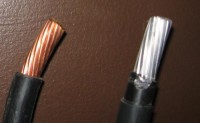Only a qualified electrician or electrical contractor should work on aluminum electrical wiring. If you need to find an electrician just go to the BC safety authority or visit their website http://www.safetyauthority.ca and click the link find a contractor -http://www.safetyauthority.ca/contact/find-contractor
There is a right and wrong way to work on aluminum wiring. To extend a circuit there are special connectors typically called marrettes that are specific for this application. Also switches and receptacles approved for aluminum will specifically state such. Finally an anti oxidant is typically applied to aluminum conductors. Switches and receptacles are more expensive but are designed for aluminum and tested to be safe.
As a homeowner there are a few things to watch for as you live in the home.
1. Do you notice there is intermittent continuity in a light or receptacle? Sometimes the light/receptacle works and sometimes it appears dead. This might be an indication of a loose connection.
2. Does the faceplate seem hotter to touch than normal? This might be an indication of a poor connection.
3. Do you notice the distinctive smell of burning or melting insulation?
4. Do you hearthe distinctive sound of electrical arcing?
If any of these are apparent. Call an electrician!
Finally periodic review of your electrical system say every 5 years may be wise to avoid unpleasant surprises. Check with your electrician on this.
Roland Klann
RHI BC Licence 47331
HomePro Systems2000 Inc.
604-240-3314
www.Homeprosystems2000.ca


No comments:
Post a Comment